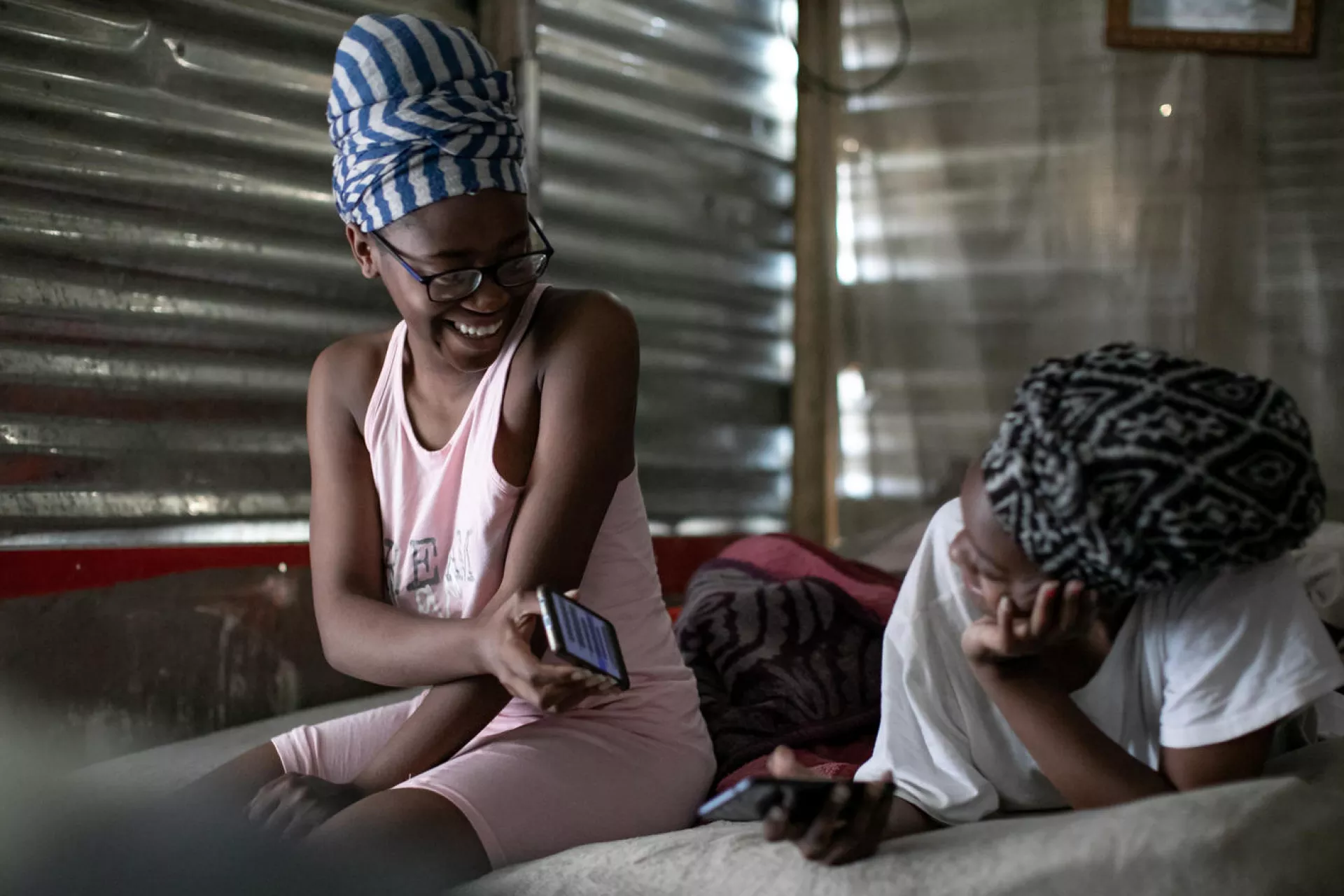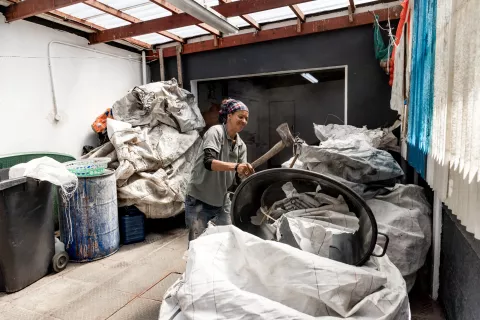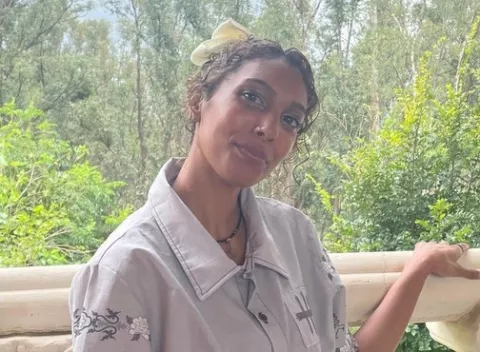Reimagine our Future Declaration
Declaration by children and youth from across South Africa

About
UNICEF South Africa and partners asked children and young people to express how they ‘reimagine’ the country beyond COVID-19. Using the proven ‘design thinking’ methodology, UNICEF in partnership with the South African Institute of International Affairs brought together virtually some 150 children and young people from across the country to discuss and produce a declaration – a call to action – that presents a vision of the country children want after COVID-19. The ‘Reimagine our Future Declaration’ is the result of the agency and power of young people across South Africa and provides a vision of ‘a future that is conducive and favourable for young people to grow and prosper, freely and with dignity.’
Reimagine our Future Declaration
We, the children and youth of South Africa, see ourselves as the generation that will spark a wildfire resulting in young people actively taking up space in all spheres of our country. We envision a future that is conducive and favourable for young people to grow and prosper, freely and with dignity. We envision a future where young people are active participants in policy and decision-making spaces from local to national level and hold our leaders accountable. We envision a future where our voices are acknowledged and our participation is not tokenistic.
This document contains the details of what our reimagined future looks like, a future with a climate resilient society, where basic needs of all people are met, and where education is free, decolonised and equal.
Economic considerations
We note with deep concern that the global COVID-19 pandemic induced economic crises which hindered poverty reduction and job creation efforts. As a result, the country's existing high unemployment rate has increased to 32.5% and this mostly affects the youth population. We acknowledge relief efforts made by the private sector to assist the public in mitigating the adverse socio-economic effects of the pandemic. In addition, we acknowledge the National Development Plan and Agenda’s recognition of the intersectionality of barriers facing women with regards to entering the job market as well as implementation of a variety measures to be consistently monitored. However, we are disappointed by the ill preparedness and lack of proactiveness of the government to supply and respond to socio-economic problems facing youth in the informal sector due to the need for alternative working conditions caused by the pandemic. This has resulted in rising levels of financial and digital inequality which mostly affects the poor, vulnerable and marginalised groups.
We condemn the mismanagement of public funds and allocation of resources linked to corruption that subsequently affects inclusive economic sustainable development and progress. We believe that as a nation, we demand accountability from state-owned agencies failing to carry out their mandate towards assisting in youth development. This will help foster transparent, consistent and effective implementation and evaluation of policies aimed towards youth, as well as other marginalised groups in need of development and upliftment.
We applaud the increase in engagement by civil society organisations and youth activist groups and urge the government to meaningfully increase their engagement with young people in decision-making spaces.
Recommendations
We, the children and youth of South Africa:
- Urge the South African government to continue supporting and encouraging youth to start innovative businesses through the National Youth Development Agency (NYDA) and other institutions.
- Plead with all sectors to invest in and create employment opportunities for young people, especially those from disadvantaged communities.
- Encourage further investment in small-scale farming and local production as well as intra- trade of produce to decrease food waste and dependency on food imports. This will help to achieve food security in accordance with the listed milestones of the National Development Plan and Goal 2 (Zero Hunger) of the Sustainable Development Goals (SDGs).
- Call for transparency and accountability regarding implementation of policy.
- Call for the strengthening of deterrence, accountability and punishment mechanisms in the public sector to tackle corruption.
- Urge the government and other decision-making bodies to increase availability and accessibility to policy engagements, especially for people from underprivileged communities, to propel inclusive economic participation.
- Further advocate for investment in infrastructure that will improve basic services and increase decent living standards, consistent with the objectives of the National Development Plan and the Universal Declaration of Human Rights.
- Emphasise the need to invest in education, training and awareness-raising on future jobs and sectors.
- Encourage further advancement of the information and communications technology (ICT) sector spearheaded by the Department of Communications, which has improved the quality of life as well as self-sufficiency of citizens that propels increased participation in the economy.
- Incentivise development of more sustainable methods to create job security for youth in South Africa.
- Encourage better executed and planned resource distribution to youth.
- Stimulate economic foresight into climate change and increase broad societal participation in investment schemes.
Environmental considerations
We welcome all advancements taken to enhance South Africa’s climate action through policy interventions including, but not limited to, the establishment of the Presidential Climate Change Coordination Commissions and the National Climate Change Adaptation Strategy. Furthermore, we eagerly wait for the South African Climate Change Bill to be passed. At an international level, we look forward to engaging in South Africa’s updated Nationally Determined Contributions (NDCs) in line with our commitment under the United Nations Framework Convention on Climate Change (UNFCCC) and the Paris Agreement.
We condemn the prevalent culture of bad governance and ill-management of state resources and realise the deep impacts this has on decelerating progress in our country’s climate change progress. We note with concern the lack of investment in capacitating young people to be agents for creating more sustainable cities in line with SDG 11, and to mitigate and adapt to the deadly effects of climate change.
Acknowledging the importance of building climate resilient cities, we note with concern the lack of implementation of existing and water and waste management policies. We recognise that a lack of knowledge on sustainable means of discarding waste impacts human health negatively, especially marginalised groups who are more vulnerable to environmental injustice.
We have observed that poor waste management, and the unsustainable practices of businesses increases greenhouse gas emissions which contributes to global warming. We understand that the burning of fossil fuels has detrimental health implications for communities and we are deeply disturbed by the marginalisation of communities that inhabit polluted and degraded landscapes with major disruptions in ecological chains. Women and children in underprivileged areas are facing climate disaster impacts more intensely that worsens social issues such as food security, immigration, land and housing.
A radical change in behaviour needs to be adopted by businesses, government and individuals if we are to win the war against the climate crisis. We have noted the important role that education has to play in combating climate change. We therefore advocate for an integrated climate change education that will allow young people to foster positive and sustainable change in their communities.
Recommendations
We, the children and youth of South Africa:
- Having examined the need for more ambitious and effective climate mitigation and adaptation actions, call for a greater focus on the implementation of climate-focused policies.
- Call for increased representation and involvement of youth in policy and legislative processes, with a focus on diversity and inclusion.
- Call for a youth-centred green recovery from the Covid-19 pandemic.
- Urge the divestment in fossil fuels.
- Encourage the establishment of mentorship programmes to support and equip young people to meaningfully engage in the climate discourse.
- Encourage broad-based, integrated and comprehensive community education on climate change and waste management.
- Call for climate change to be integrated across all subjects in the basic education curriculum.
- Keeping in mind the importance of building climate resilient communities, we implore for intersectionality and inclusivity to be principles that underpin climate action, as guided by Agenda 2063.
- Welcome the Department of Environment, Forestry and Fisheries’ initiative to create green jobs for young people in the country and further recommend collaboration between the Department of Environment, Forestry and Fisheries and the Department of Small Business Development to fund green and sustainable businesses led by young people.
- Recognise the importance of contextualising climate change issues and tailoring solutions that are responsive to problems we face as South African youth.
- Encourage an orderly and just transition to a clean energy economy with the reskilling and tooling of the energy workforce to thrive in the post-COVID-19 world.
- Emphasise the need for investment in renewable energy production, including composting and biofuels with a focus on strategies to generate energy from biological waste.
- Draw attention to the large emissions caused by fossil fuel dependent businesses such as SASOL and ESKOM and call for harsher penalties and regulations to encourage a reduction in emissions.
- Support the need for fostering an environment that is accommodating to innovative and green entrepreneurship that is sustainable.
- Encourage stakeholders to incentivise a transition to more sustainable transportation.
- Request for more support (technical and financial) to be given to research projects to foster greater understanding of South African environmental issues and how to communicate the findings to communities.
- Encourage private industries to focus on creating more green jobs that will advance the agenda of a just transition, and encourage the private sector to support youth-led green businesses.
- Further recommend that income generated from carbon tax be directed towards strategies to reduce emissions and encourage investments in energy-efficiency and renewable energy.
Social considerations
We note with concern the deepening gender inequality gap that has further been exposed by the COVID-19 pandemic. This has resulted in the increase in the rate of gender-based violence, femicide, human trafficking, lack of access to reproductive healthcare, and sexual exploitation in the workplace. In addition, we are alarmed by the culture of apathy, lack of responsiveness, and lack of urgency in enforcing prevention and deterrence measures towards issues of gender-based violence. This has exposed the lack of capacity by civil servants to handle and ensure the safe reporting of gender-based violence cases.
We are deeply concerned by the violence in townships and the recruitment of youth into street gangs which is a result of unemployment, poverty and lack of educational guidance outside of school activities, among others.
We find it deeply concerning that young girls and boys are still not adequately and appropriately educated on issues of menstrual healthcare, menstrual health education, sexual and reproductive healthcare, and sexual reproductive health rights. As a result of this, stigma and discrimination around these issues remains entrenched within communities.
As young people, we also note with disapproval the absence of a singular, collaborative and uniform effort to deal with intersecting issues such as health, safety and education which disproportionately affect those already marginalised. This includes issues which are rooted in inequality such as a lack of access to digital infrastructure and resources to equip students with the necessary resources and tools to continue with their academic programmes, and the growing gap between private and public health and education institutions. Moreover, we continue to call for all school systems, including basic and higher education, to be made more accessible for young people from disadvantaged communities.
We remain disappointed that inequalities and injustices that arise as a result of a lack of representation of youth in decision-making bodies equate to solutions that are non-inclusive and not implemented. Furthermore, we are concerned about the lack of equitable distribution of basic services such as housing, adequate medical care, food security, education and educational facilities.
Recommendations
We, the children and youth of South Africa:
- Call for the prioritisation of free, decolonised and equal education across all levels.
- Seek the implementation of a youth quota to ensure the participation of youth and youth organisations in policy and decision-making processes across all governmental spheres, including positions within government at national, provincial and local levels.
- Advocate for funding and mentorship support for youth-owned businesses.
- Call for an annual 10% increase in the national budget prioritising youth business development and funding.
- Further call on the government to increase their support of community-based organisations and non-profit organisations, particularly in rural areas, to ensure these organisations have the necessary resources to operate effectively and fulfil their mandates.
- Urge government to implement more policies directed at ensuring the safety of all members of society including women, children and members of the LGBTQIA+ community.
- Strongly request the implementation of effective gender-based violence and femicide units within police stations to ensure that reporting, counselling and rehabilitation processes are handled with the utmost care and urgency.
- Request an increase in mobile clinics and healthcare facilities in disadvantaged communities.
- Recommend the introduction of youth-focused sexual reproductive health education programmes in health care centres, community centres and schools.
- Call upon stakeholders to collaborate with youth-owned organisations to implement educational drives that increase meaningful youth participation in policy, decision-making and implementation.
- Request that systematic inequality in schools is addressed through the amendment of the Department of Basic and High Education policies and school codes of conduct.
- Further call for diversity and equal opportunity, resources and infrastructure in all schools.
- Encourage adaptation of the current school curriculum to include personal financial management, healthcare and administrative skills.
- Urge government to provide disadvantaged youth the means to attain equal and affordable education opportunities.
This declaration was created by children and youth from across South Africa through the support of UNICEF South Africa, Youth@SAIIA and other partners. For more information, contact us via email at youth@saiia.org.za




